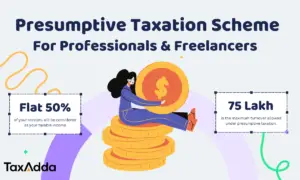Fringes benefits taxable in case of all employees: –
(1) Interest free or concessional loans from employer
Taxable Value = Maximum outstanding monthly balance X Rate charged p.a. by SBI on similar loans on 1st day of the relevant previous year – Interest actually paid by employee or any of his household members.
Maximum outstanding monthly balance means the aggregate outstanding balance for each loan as on last day of each month.
Exemptions
- When the amount of loan is not exceeding in aggregate Rs. 20,000/- or
- Loan provided for medical treatment of diseases as specified in Rule 3A. However, if any amount is recovered from insurance company, then it will be chargeable to tax if the loan is still outstanding
(2) Travelling, touring and accommodation
When any expenses relating to travelling, touring and accommodation is paid, borne or reimbursed by the employer for any holidays availed by the employee or any of his household members. In such case taxable value shall be: –
- Actual expenditure incurred by the employee.
- Where such facility is maintained by the employer and it is not uniformly available to all the employees – Value at which other agencies provided such service to general public.
- Where employee is on official tour and expenses incurred for any of his household members – Expenditure incurred on such household member.
- Where employee is on official tour and it is subsequently extended as a vacation – Expenditure incurred in respect of such extended period of stay or vacation.
(3) Free/concessional food and non alcoholic beverages
Taxable Value = Amount incurred by the employer – Amount recovered from the employee
Exemptions
- Tea or snacks offered during working hours.
- Free food and non alcoholic beverages provided during working hours in a remote area or an off shore installation.
- Free food and non alcoholic beverages provided during working hours in office or business premises if value per meal does not exceed Rs 50. If the value exceeds Rs 50 then only such excess amount shall be taxable.
(4) Use of movable asset
Taxable Value
- Owned by employer – 10% p.a. of original cost of assets.
- Hired by employer – Actual hire charges paid by employer.
(5) Transfer of movable asset
(a) Computer and Electronic Items
Taxable Value = Original cost to employer – Depreciation @ 50% WDV for every completed year of usage – Amount recovered from employee
(b) Motor Cars
Taxable Value = Original cost to employer – Depreciation @ 20% WDV for every completed year of usage – Amount recovered from employee
(c) Other Assets
Taxable Value = Original cost to employer – Depreciation @ 10% SLM for every completed year of usage – Amount recovered from employee
(6) Gift
It includes voucher/token in substitution of such gift.
Exemption – If the aggregate value in a previous year is less than Rs 5000, then the whole of such amount is exempted from tax.
(7) Telephone or mobile bill
If an employer pay or reimburse any telephone or mobile phone bills then there it will be exempt from tax.
(8) Any other benefits or amenity
Taxable Value = Cost to the employer under an Arm’s Length – Amount recovered from employee
Additional Points
Member of household shall includes
- Spouses
- Children’s and their spouses
- Parents
- Servants and dependants.

